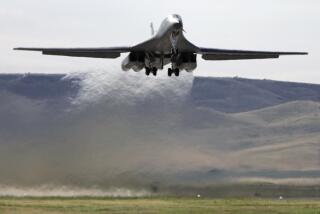Memo Says U.S. Excused Alleged B-2 Overcharges
- Share via
Even though the Justice Department decided in 1988 that Northrop had submitted false reports on the cost of the B-2 bomber program, it declined to sue the firm for fraud because it appeared that the Air Force had already excused Northrop’s actions, according to an internal Justice Department memorandum.
“The Air Force was fully aware that Northrop’s reports were false and moreover had general knowledge of the true state of affairs with respect to Northrop’s cost overruns and schedule delays,” the memo said. It was written by Assistant U.S. Atty. Howard Daniels of Los Angeles in explaining why he decided not to sue Northrop.
Rep. John Dingell (D-Mich.) quoted the memo at length in a letter charging that the Air Force’s management of the B-2 program is “nothing short of criminally negligent,” and that the service’s practice of “coddling Northrop has made a bad situation worse.” Dingell’s letter was written to Defense Secretary Dick Cheney, calling for a “court of inquiry” that would review the actions of the Air Force.
The Daniels memo cited by Dingell lays out an extraordinary list of charges about Air Force mismanagement of the B-2, the most costly aircraft program in history.
The Air Force maintained only two auditors at Northrop’s B-2 bomber division to oversee the activities of 14,000 employees in the early 1980s, a period when the Pentagon spent nearly $25 billion on the B-2, according to the Daniels memo.
Moreover, the Air Force’s B-2 bomber program office had only two people at the Northrop plant. The Air Force’s program manager in charge of the B-2 rarely visited the plant and when he did, he gave Northrop advance notice, Daniels’ memo said.
Pete Williams, assistant secretary of defense for public affairs, said Wednesday, “Mr. Cheney has not had a chance to read the letter. We want to take time and care in answering it.”
But Williams noted that Cheney has spent significant time examining the program and decided to support it after the recent major aircraft review, though the orders for the aircraft were cut back. “He retains confidence in the aircraft and in Northrop,” Williams said.
Air Force officials declined comment on the letter. Daniels was out of his office Wednesday and could not be reached.
Northrop spokesman Tony Cantafio said the company conducted its own internal investigation into the original fraud allegations and found no evidence of fraud. “After nine months of examination, we found no substance to the proclamations,” he said.
Northrop was originally sued in February, 1988, by four employees, who alleged that the Los Angeles-based aerospace contractor overcharged the government by more than $2 billion. The suit, which was filed under the federal False Claims Act, alleged that improper charging occurred on the B-2 program.
Under the False Claims Act, the Justice Department can intervene as a plaintiff, but declined to do so in November, 1988. The suit is still being pressed by Claremont attorney Herbert Hafif, who represents the original plaintiffs and three additional employees who joined under an amended complaint.
Cantafio said Northrop has filed a motion to dismiss the case. Two earlier motions were rejected by U.S. district court judges in February and in April, 1989.
A key aspect of the case involved the allegation that the company’s “earned value system,” in which Northrop is periodically paid by the Air Force for work completed, was flawed and that Northrop misrepresented the amount of work it had completed. Thus, it would have been paid for work not yet finished.
In his memo, Daniels addresses these charges as they related to the Cost Schedule Control Systems, or CSCS. “Northrop’s CSCS is essentially a farce,” the Justice Department concluded.
But since the Air Force knew the system was inadequate and had essentially excused it, Daniels concluded that the government had forfeited its right to sue.
“While certain of the allegations concerning program deficiencies are essentially accurate, the Air Force has known of these facts for some time, but has chosen to take no remedial action,” the Daniels memo said. “Accordingly, there is no provable fraud because there is no detrimental reliance on false representations.”
Dingell charged that such a situation “raises the real specter of a conspiracy between the Air Force and Northrop to mislead the office of the secretary of defense and the Congress in an effort to protect their pet programs.”
But Hafif said he was “outraged” by the Daniels memo, because of the flawed legal theory he said Daniels espoused.
“The fact that a few members of the Air Force knew does not excuse the fraud,” Hafif said. “They were not authorized to excuse the fraud. There is no general authorized to excuse fraud.
“What it tells me is that this U.S. Attorney’s Office doesn’t like to work weekends, or they are being directed from above. Either way, it is a disgrace.”
Hafif said he would continue to pursue the case, though he cited difficulties owing to the continuing secrecy in the program that limited his ability to participate in the debriefing of witnesses.
In addition, Hafif disclosed that a second, sealed portion of the lawsuit makes a number of additional allegations about Northrop, which the Justice Department is reviewing.
More to Read
Sign up for Essential California
The most important California stories and recommendations in your inbox every morning.
You may occasionally receive promotional content from the Los Angeles Times.











